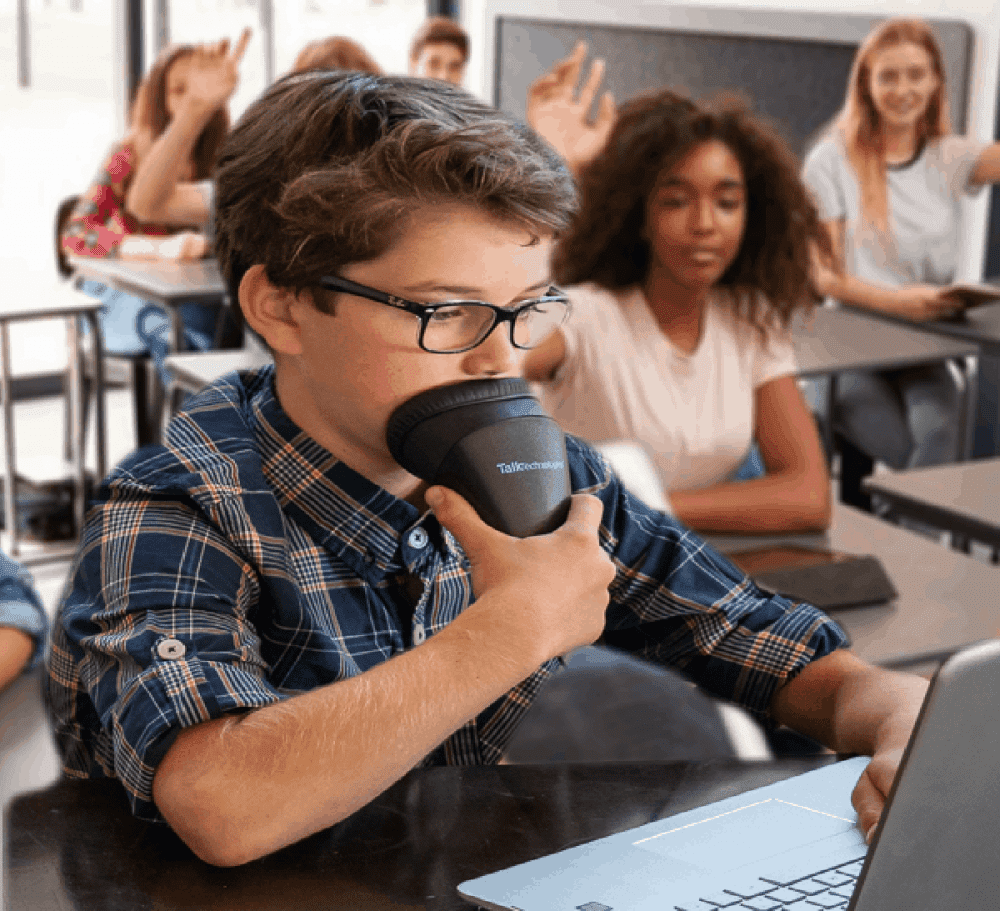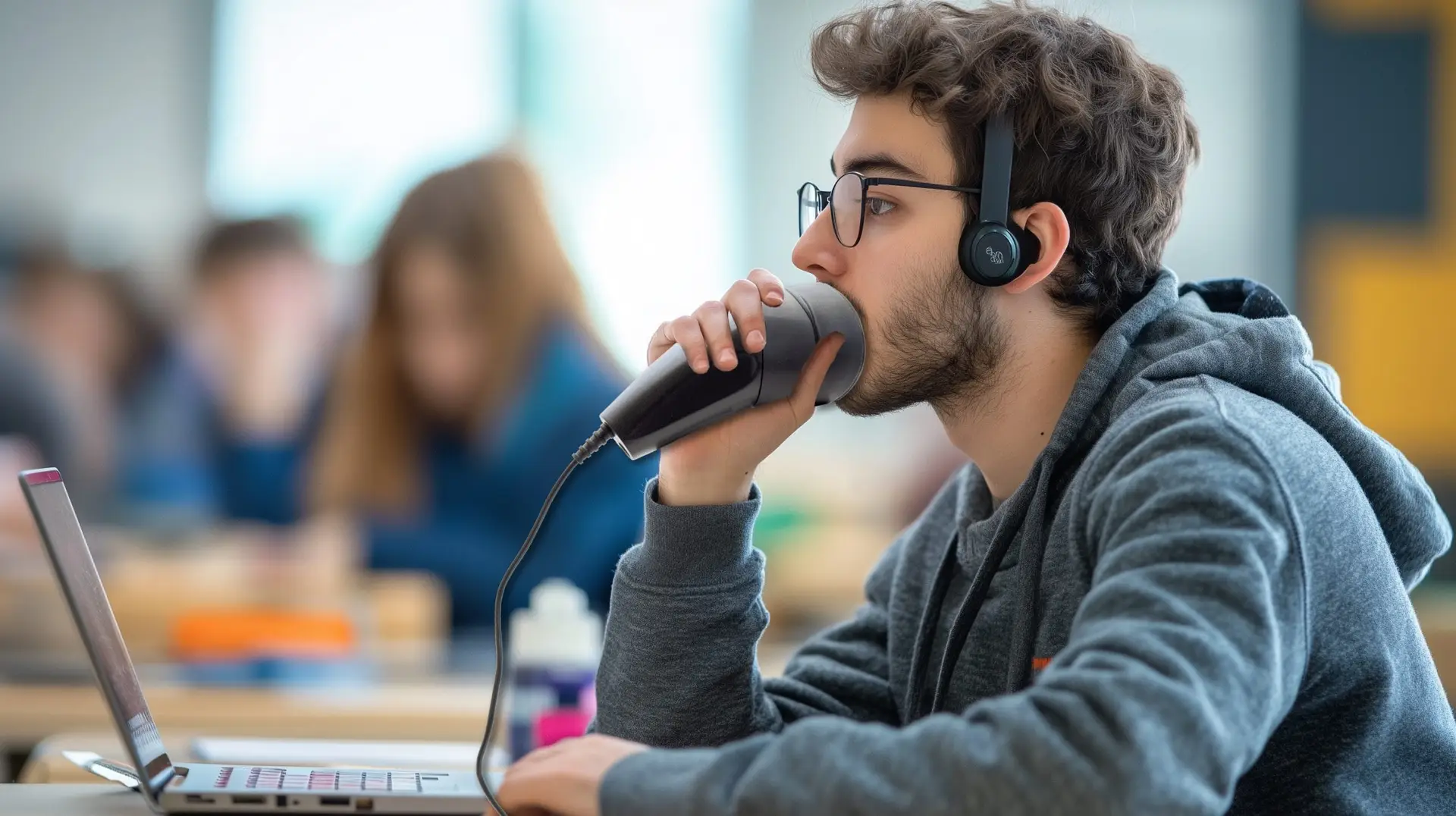Privo – A revolutionary tool for individuals with physical limitations and language based processing differences

Assistive speech recognition microphone for the classroom
Individuals with physical limitations and language based processing differences can now freely and confidently complete their notes, projects and exams alongside their peers
they use them at my daughter’s school, which specializes in Dyslexia. You get twelve 8th graders all using voice-to-text in a classroom… these things are a lifesaver.
Speech recognition is extremely beneficial for individuals with physical limitations and language based processing differences however it has been inconsistently implemented over the years. The latest speech technology has improved by leaps and bounds in regards to ease of training and use. It is now surpassing human accuracy rates. If you haven’t used speech recognition lately it is time to take another look.
There are two major issues when using speech recognition. Privacy and accuracy.
How can one use their voice without being overheard and at the same time eliminate background noise to attain optimal speech recognition accuracy rates?
Privo (preevoh) is a wireless speech recognition handset microphone that allows you to use speech technologies privately and accurately anywhere. We are seeing a dramatic increase in individuals and organizations embracing this technology. Individuals with physical impairments and learning disorders can now freely and confidently use speech technology alongside their peers, thus giving them a leg up as speech recognition dramatically improves productivity and engagement.
People that can benefit from Privo include users with:
Language-based processing differences like Dyslexia and Dysgraphia
Repetitive strain injuries, such as carpal tunnel syndrome
Poor or limited motor skills handwriting or using a keyboard is difficult or not an option due to low vision or physical impairment
Vision impairments
Physical disabilities
Limited English Language
The benefits of using Privo include improved access to the computer, increased writing skills, improved test scores and grades, increased independence, decreased anxiety towards writing and improvements in core reading and writing abilities.
Improved access
For people with motor skill limitations, physical limitations, blindness/low vision, or other difficulties accessing a standard keyboard and mouse, hands-free computing through the use of speech recognition technologies are extremely beneficial. By removing the physical barriers to writing and navigation of the computer, you can increase access to technology and inclusive activities.

Increased writing skills
For students with language based learning differences, speech recognition technology can encourage writing that is more thoughtful and deliberate. Studies with middle and high school students with learning disabilities have shown that input via speech is less challenging and that students frequently generate papers that are longer and better quality using speech recognition technologies.
Privo used in conjunction with a documentation program such as Microsoft Word or Google Docs reduces the difficulties that students face with writing mechanics. Because students can write naturally with speech recognition it eliminates potential obstacles such as difficulty with handwriting or the need to transcribe thoughts while brainstorming. Often writers with learning disabilities will skip over words when they are unsure of the correct spelling leading to pieces of writing that are short, missing key elements, or not reflective of the student’s true abilities. Speech recognition and word processing alleviate these concerns by allowing the student to get their thoughts out without worrying about these or other technical writing components.
Increase test scores and grades by decreasing anxiety
Privo removes the fear associated with writing tests and completing assignments. Test questions can be read aloud to the student eliminating any confusion concerning their connotative meaning while answers can be completed via voice without being overheard thus allowing the student to confidently complete tasks in a timely, grammatically correct and organized format.
In addition to allowing the student to work in a more independent manner, Privo allows students to voice write without fear of being overheard helping them avoid the anxieties associated with feeling embarrassment about their writing.
For students who are English Language Learners or are learning a second language it allows them to practice pronunciation in a safe, low-stress environment. Students can engage in multiple repetitions of an unfamiliar word without worrying about feeling embarrassed.
Increased independence
For students with physical limitations, poor motor skills or learning differences, a human transcriber or teacher assistant is a low-tech solution for the classroom that allows the focus to shift from the physical act of writing to expressing thoughts and knowledge. However, a transcriber makes the student dependent upon a teacher or aide for writing tasks. Students who use transcribers for writing often report spending less time planning and organizing because they felt they were keeping the transcriber waiting, or felt embarrassment about making mistakes or asking for multiple readings of what was written. Using speech recognition allows the student to be more independent in their writing and other academic activities.
Improvements in core reading and writing abilities
Privo can also serve a remedial function for students in the areas of reading and writing. In allowing students to see the words on screen as they dictate, students can gain insight into important elements of phonemic awareness, such as sound-symbol correspondence. As a student speaks and sees their words appear on the screen, the speech recognition directly demonstrates the relationship between how a word looks and sounds. This bimodal presentation of text can be especially helpful for students with learning disabilities, and is thought to be why speech recognition has been found effective in remediating reading and spelling deficits.
Another key benefit is the error correction process. As the text is recorded it requires user to check the accuracy of each word uttered as sentences are being dictated. When an error is made the student must find the correct word among a list of similar words and select it. This process necessitates that the user examine the word list closely, compare words that look or sound alike and make decisions about the best word for the specific situation. This can give kids a boost in reading and spelling as they learn to discriminate between similar words.
“Comfortable and effective device! This works great in the classroom. My students can confidently use speech technology without bothering anyone around them” M. Shain, Tulane University
Below is a review from a major assistive tech advocate in the UK – Ted Pratt.
I have just spent some time evaluating this product from Talk Technologies and must say that I was very impressed with the results.
Essentially it is a very special microphone for use with Dragon or indeed any propriety Speech to Text software.
It allows a student, or in fact anyone who needs to use speech to text under difficult circumstances such as :-
a) In a private capacity whilst in a classroom or lecture theater environment.
b) In a very noisy environment.
During tests I carried out I found that when the microphone was being used the person sitting next to me could not hear my voice at all, also with the radio turned up loud in close proximity to me I was still able to get 100% accuracy with Dragon.
The microphone has been used in Canada and the States for some time assisting students with specific learning difficulties, especially those with conditions such as Dyslexia and Asperger’s.
The mask can easily be cleaned with propriety cleaning products but a Hygiene pack is also available where masks have to be interchanged for different users.
Live demonstration video
